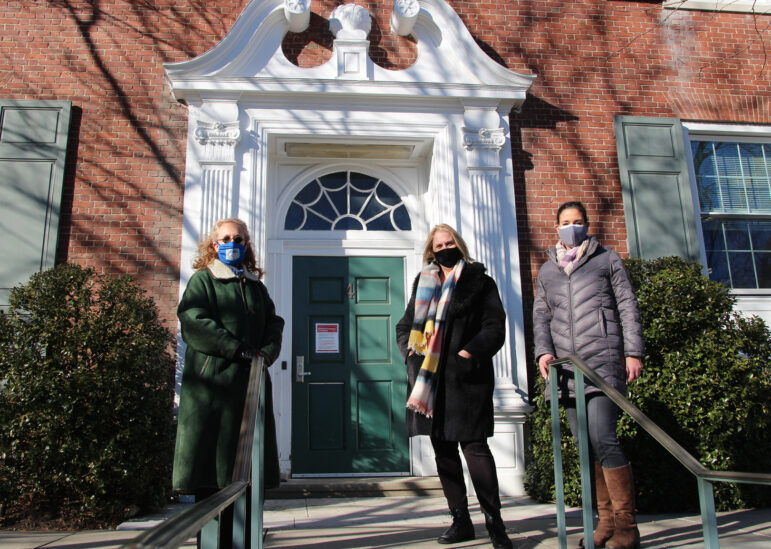By Katherine Mintchev, Greenwich Academy, Class of 2022
Prior to the COVID-19 pandemic, thousands of Greenwich residents were already experiencing class-based inequalities. As COVID-19 intensified the disparities, the Boys & Girls Club of Greenwich and Community Centers Inc. tried to ease the pressure.

‘We’re all in this together.’ This has been the rallying cry among elected officials and healthcare leaders since the onset of the COVID-19 pandemic. The phrase has served as a reminder of the loneliness and anxiety that COVID presented people with. But are they correct?
Critics of the phrase argue that it is misguided. According to Mya Guarnieri of The Washington Post, “The coronavirus has been anything but a great equalizer. It’s been the great revealer, pulling the curtain back on the class divide, exposing how deeply unequal this country is and how deep the fissures are.” Indeed, COVID-19 has disproportionately affected poorer communities and communities of color across the US.
For local organizations like the Boys & Girls Club of Greenwich (BGCG) and Community Centers, Inc. of Greenwich (CCI), the phrase has adopted its own meaning. These days, it has become a slogan promoting unity in order to support those who need the most assistance.
But which local demographics require the most aid throughout the pandemic? For the BGCG, answering this question was an essential step in maximizing the efficacy of their services.
The key lied in connecting with individual families. As the pandemic forced the Club to close its doors on March 13, two months of virtual support allowed them to do just that.
“The virtual programs helped us identify if kids needed virtual support or help in other areas, and [need] was identified by talking to families and finding out what kids needed most,” said Cristina Vittoria, the Chief Executive Officer of the BGCG.
Megan Sweeney, the Vice President of Administration at the Club, said that low-income families have required increased support.
“On average, we have about 55-59% of our youth who are in the low-income bracket. However, we noticed that those who are currently using the program are more likely to be low income…Since the pandemic, approximately 86% of the teens using our program are of low income.”
As the Club’s programs returned to in-person formats in the summer, it was the children themselves who promoted unity within their social circles, fueling a sense of perseverance in the Club.
“Students [throughout the pandemic] have displayed a greater sense of empathy for one another in many ways…I observe members helping each other with homework, reviewing assignments together, and even reading together. It is as if they have literally taken on the slogan, ‘We’re all in this together,’” Sweeney said.
Vittoria noted that the BGCG’s new sense of unity—both in identifying the need and running their programs—has changed the way the Club will operate for good.
“The need for our services has been underlined more than ever,” Vittoria said. “Many families are essential workers and don’t have an option to stay home…and parents need supervision for their kids in times when they don’t have the flexibility to leave them at home…We are here for all of these things.”
Just like the BGCG, the CCI marked an increase in need for the same demographics they have always supported. Before 2020, CCI supported groups such as low-income families, residents of Greenwich public housing, disabled persons, and the elderly community. COVID-19 brought heightened challenges for all of these groups.
Increased food insecurity is one issue that the CCI has responded to. Low-income families have always faced food insecurity in Greenwich—according to the CCI, 6 percent of residents (roughly 3,700 people) typically experience food insecurity.
Unemployment, illness, and other developments as a result of COVID-19 have only exacerbated this crisis.
“We provide food delivery to 40 families and approximately 85 senior citizens two times per week,” said Gaby Rattner, the Executive Director of CCI Greenwich.
Over the summer, CCI worked to safely open their summer camp programs for children. They currently offer a variety of educational opportunities, including free learning pods for high school students and virtual groups for special needs clients.
“Providing food and education are two of the most important things we have done through the pandemic,” Rattner said.
Through all of these efforts, Rattner said CCI had learned the importance of unity and personalized aid for their clients.
“We have noticed a greater need for individual counseling and support across the board,” she said, adding, “The most important thing we’ve learned is to be open to doing something you’ve never done before if it is what [the clients] need.”
Markedly, the individual support and unity which Rattner called for at CCI is currently in-action at the Boys & Girls Club—and it has made all the difference.
Ms Sweeney from the Boys & Girls Club stressed that this unity has alleviated stress and strengthened the bonds between members.
“I often overhear conversations about reminders of things to do, discussing memories of good times and sharing what [kids] did over the weekends with family… [There is] a contrast from the past, a time when all of us were always rushing,” she said.
In every aspect of the word, unity has been the rallying cry of organizations like the BGCG and the CCI, powering their unique support methods throughout the COVID-19 pandemic.